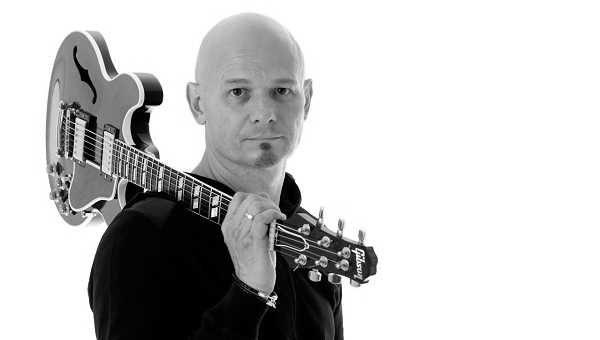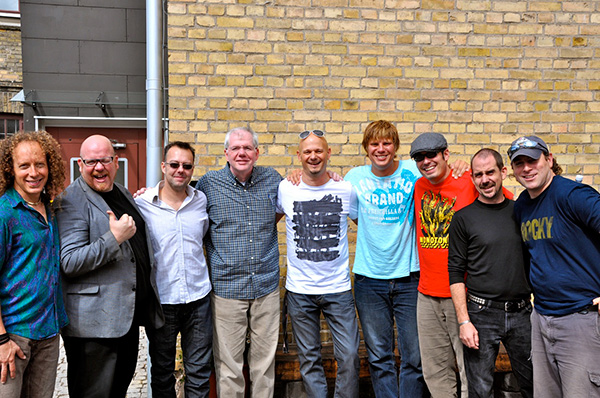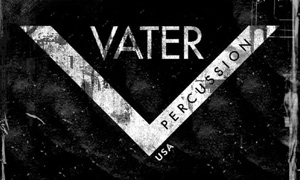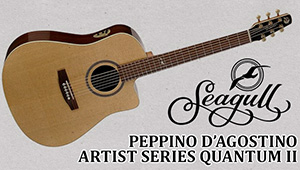 Soren Reiff
Soren Reiff

Danish musician Soren Reiff is a multi-talent. On the music side, he is a natural born guitarist and has worked as Musical Director for Chaka Khan and David Sanborn. He has also appeared on several Danish television shows. Soren is also the author of several instructional books and a book about the music industry. He took a few minutes to share some thoughts with us.
When was your own personal “wow” moment…when you knew you wanted to become a professional musician?
I have had a couple…the first was when I was about 10 years old, and my big brother invited me to an Eric Clapton concert. When the band played “Key to the Highway” I was blown away, and after the concert I told my brother that I wanted to play like that. That night I knew that music would be a major part of my life.
The second “wow” moment was when I was around 16 and some friends of my family were about to make a record. They asked me, if I wanted to join them one day in the studio, so I could see how everything was done. I was like hypnotized when I entered that huge recording studio. I ended up hanging out there for weeks, until all the recordings were done and the album was mixed.
What were some of your early obstacles…and how did you overcome them?
Except for my bigger brother and his friends, there was no one in my neighbourhood who played music. I used to listen to them a lot, and I imagined how it would be, to be a part of their group. I practiced as much as I could by myself, knowing that later on I would be forced to focus on the “playing together” issue, but at that time all I could do was to prepare myself for it as much as possible, by practicing scales and chords.
Practicing from early morning until late night used to give me problems with pain in my hands and wrists. A doctor told me to warm up, as if I was a sportsman, before practicing. Since then, I haven’t had any of that kind of problems.
Nervousness and “stage fright” are common fears for some young musicians. Were they an issue for you, and if so, how did you overcome them?
In the beginning, when I was really young, I didn’t give it any thought, but later on when I started working with the pro’s in Denmark I got scared. The first times I was going to play with some well-known people, I was scared to death. One of them told me, that the reason for me being at the gig was because the others thought I would do a great job – that helped. Also hanging out with some artists that were real “old” in the business taught me that: “It’s just music … let’s have fun while playing and enjoy it.”
You have been featured on Studio Jams a couple of times. How would you best describe your experiences appearing on the program?
Being on Studio Jams and working with Tom Emmi have been some experiences to remember. The way Tom controls and inspires everybody involved is super … very impressive. Giving my own experience from my 15 years involved with TV, I’ve grown used to a lot of waiting time, and rehearsals. I almost couldn’t believe that it was actually possible to do a whole TV-programme within a single afternoon. When I saw some of the earlier Studio Jams shows I fell in love with the concept … I really think it’s a unique way to show the working progress, which you would normally not see as a non-musician. Plus as a musician, I find it very interesting seeing other artists approach to the creation of music.
After doing the first show, which we recorded in Copenhagen, Denmark, I really wanted to do more, so I was very happy when I got invited back to do the second show, which we did in Gothenborg, Sweden. I’d been working in Denmark all week until we were to record that show, so I arrived to Sweden during the night. However, just as I was leaving for Gothenborg, I realised that my main guitar was dead, and on top of that all my presets in my rig, that I’ve been developing for years was zeroed. But the whole atmosphere in the studio – meeting Tom again and Tracy Silverman and the Swedish musicians for the first time was so intense, and we got down to what’s important – having fun making music! Luckily I forgot everything about missing presets and playing a rather new guitar instead of my old first choice, that’s the magic of music.

(A group shot of Soren with the musicians and production crew following the taping of Studio Jams Episode #47 in Gothenburg, Sweden.)
You are a first-class composer and contemporary songwriter. In your opinion, Soren, is songwriting an art, or a craft?
I don’t think I can be the judge of whether it’s art, but for me it’s very intuitive to compose … I believe I practice composing everytime I’m improvising. Normally, when I’m composing music for albums, the music comes really fast and from “nowhere.” The arranging hereafter is a combination of intuition and craft – the knowledge of what will work in certain styles.
If I’m asked to compose for a certain purpose, like a commercial or for a TV-show, it’s much more the craftsman in me working, combined with the good help of my intuitive and artistic side.
What are some of the keys to being a successful and effective studio musician? Any tips on how to best gain studio experience?
Attitude … being openminded and nice to hang with is a good starting point. And then it’s a matter of getting as much routine as you can possibly get. Record yourself when practicing, and overall try to get lots of studio recording experience. Offer to record with everyone you know who have recording projects.
Earlier in my life, I was doing a lot of houseband-gigs on TV-shows, and here it was a part of my job to adapt the sound of a certain player or style. Therefore I spent a lot of time to seek the right equipment for that particular type of gig and to get acquainted with my setup, so this helped me to be able to simulate lots of different sounds and styles. Useful when you often have to play the latest hit-song of a certain artist, whom you are going to back that day. In addition to that, try to play as if every single note is the most important note you are playing, every time you pick up your instrument. When you hear a serious, professional play his first note at soundcheck, it sounds like it’s a matter of life or death … every note counts. When we recorded some of the tracks for my “Miss you” album, Steve Ferrone summed that up very well. When I asked the band if we should try to run through the scores I just gave them – he then said: ”Try…why don’t we just do it?”
When you are in the studio recording your own material, how much flexibility do you allow your other musicians to interpret your charts?
I always try to make some nice sounding demos, showing the main grove, bass line, chord voicings and dynamics. Normally all fundamentals are written in the parts. I would write all guide lines with a slightly smaller head, and bold out the few important things I know I want in a specific way, like breaks, pickups for new parts, topnotes in a certain role or a specific bass line that’s important. But from then on I really encourage the musicians to do all they can to make it there own, to add or remove what they think is needed.
If I have the privilege of having aces such as Jimmy Haslip, John Peña or Will Lee in the studio, I think it would be crazy to make them read every single note in a bass line I’ve written, it’s better to give them a direction by reading my suggestions while listening to my demo, and then let them do what comes natural to them. In my opinion it then ends up becoming the most natural. There’s a reason why these artists are first call studio players for so many world-class producers. I truly believe I need to be open minded and flexible when I have the privilege to work with such fine musicians.
How do you know when a track is complete?
That’s a tough question. I guess, I kind of have a sixth sense that tells me when it’s time to stop. When I forget to focus on things and just get carried away by the overall sound of a track, I think it’s about to be done. If I get a feeling like: “Oh, I forgot to breathe”… then I’m really satisfied, and know it’s time to move on to another track.
Can you share details on one of your more memorable studio experiences?
Oh, there are so many. But one experience that underlines what I said earlier, about playing as if it’s a matter of life or death, was when we were tracking drums and bass for a song on the “Miss You” album with Ricky Lawson and John Peña. Suddenly an alarm went off real loud in the studio, warning us that the power for the studio would go within a few minutes. This alarm was of course totally out of time and extremely loud. I asked the engineer if this sound would end up on the tracks too, and he replied that he guessed it would, so I stopped the take. When I later listened to the tracks both John and Ricky played like every note counted – everything was still tight and grooving despite this weird sound of the power alarm. That was quite impressive.
What for you is the most frustrating aspect of the music industry today?
It must be piracy. The fact that some people seem to think they don’t need to pay for the music they are listening to. No matter how much I love my job I also need to pay rent and feed my family. I don’t believe that many people would be ready to work all day, all week, all year, without getting paid, so I can’t figure out why some people seem to think that musicians and composers don’t need to get paid, just because they love their job playing and making music.
While I understand it may be difficult to sum it up in a few short sentences, in your opinion, Soren, in the past few years, how has technology changed the music industry – both good and bad?
There are so many issues. The fact that it is possible to do professional recordings in a hotel room, while you’re on tour. Today you don’t need a big, expensive commercial studio to be creative, and produce great sounding recordings – that is fantastic. Also the fact that you can do sessions without actually being in the same town or country via the internet, opens up to new opportunities. When I’m working on music for a track or a commercial, I can, due to time difference, send tracks to session players in other parts of the world when my day is over, and when I wake up the next day I’m able to continue working on the tracks, only now it’s been added keys or percussion by an overseas based musician… that’s not only very nice, it’s also very timesaving.
Another great thing is that today, it’s far easier to communicate with people who are interested in music. Along with it being possible to promote music in a completely other way than it was ten years ago. All in all…the internet has opened up to fantastic possibilities!
Tell me about “Miss You.” How did it come about? What makes it so special?
After I did the “Funky Flavas” album which I recorded in Denmark, with Danish musicians and guest performances by Michael Ruff and Mike Stern, I started writing music for the next album. During the period of all the Jazz festivals in Scandinavia, I was playing with David Garfield (keys), Steve Ferrone (drums), Will Lee (bass) and Alex Ligertwood (vocals). We had a day off in Denmark and instead of going to Tivoli gardens David, Will, Steve and I went to the studio and recorded some of the songs I had ready. After that I was in L.A. several times and recorded the rest of the songs there with Ricky Lawson (drums), John Peña (bass), Michito Sanchez (percussion) and David Garfield. The final recordings I did back in Denmark. During the period I was finishing the recordings, I lost my dad and became a dad myself, for the first time. These experiences made me go through a lot of different emotions and matured me as a human being. All these emotions went into the songs on that album.
How often do you travel to the United States? Any trips planned soon?
Oh, I really want to go again soon. I’m working on my third album these days. I have recorded all bass and drums for all the songs together with Jimmy Haslip (bass) and Gary Novak (drums). And the plan is that soon Michito Sanchez is going to add percussion and David Garfield and Kim Hansen keyboards, but I’m not sure when I’ll be there for this … hope really soon. I really miss the American vibe. Every time I’ve been to the U.S. it has been like eating 100 vitamin pills … so very inspiring and motivating.
How can people best find you online?
There are several ways. You can visit my website, or check me out at any of the profiles below:
Soren Reiff on Twitter
Soren Reiff on YouTube
Soren Reiff on Facebook
Soren Reiff on MySpace
Any other comments you would like to share (other projects, etc.)…
At the moment I’m also working on getting all my instructional books translated into English – I’ve written four guitar books and people have been asking me for quite some time to get them translated. Hopefully I will soon announce news on those plans too. And off course I also hope that Studio Jams soon will be back in Scandinavia – or that I have the possibility to hook up with the show next time I’m in the USA!
—
For more information about Soren Reiff, visit his website.





